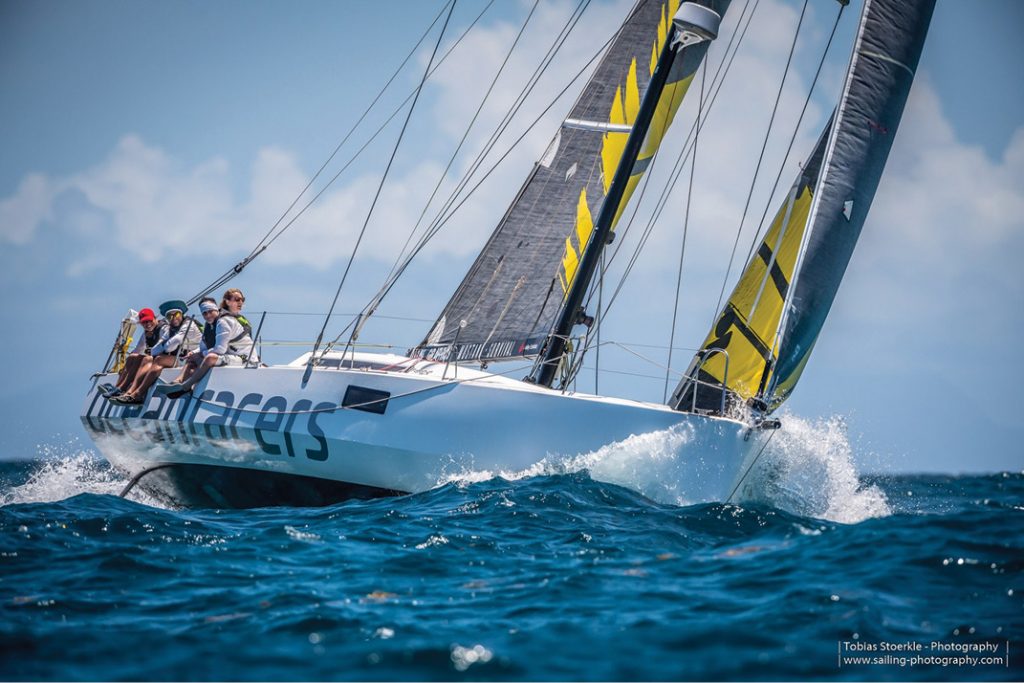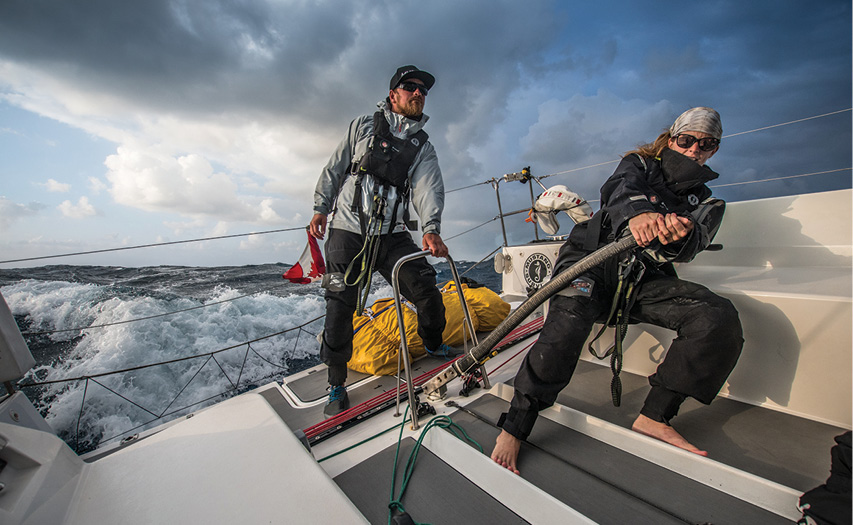By Meg Reilly, Co-skipper Ocean Racers
On Wednesday, August 28, a group of curious offshore sailors gathered at the Essex Yacht Club in Essex, CT for the second installment of the Essex Ocean Racing Forum. The quarterly meeting fell on a stormy summer night, providing the perfect complement to the event’s subject matter.
The crowd was filled with commodores, various club members, Newport Bermuda racers, and seasoned blue-water cruisers. Hundreds of thousands of ocean mile experiences were represented in the room, many of which were attributed to the presenters. The youngest and yet arguably most experienced ocean racers in the room: Ocean Racers.
I say this most humbly. It is not often that young sailors can stand in front of a room of seasoned sailors at a prestigious Northeast yacht club and have both their attention and admiration. Five years racing around the world comes with a lot of learning, and we are eager to share the knowledge and even the actual experience with those who want to get into ocean racing themselves.

A crew of ambitious, fun-loving sailors with professional experience and passion for offshore sailing, Ocean Racers provides a gateway into the world of blue water sailing and adventure. © Tobias Stoerkle – Photography/sailing-photography.com
After circumnavigating on the Clipper Round the World Race in 2013, and winning, my partner Morgen Watson and I launched Canadian Ocean Racing with the IMOCA 60 O Canada. Our mission to build the next generation of ocean racers by providing access and opportunity soon expanded internationally as Ocean Racers in 2016. With the acquisition of our race yacht and home, Hermes, a Pogo 12.50, we provide a platform for men and women around the world to participate in world-class racing and training.
Our presentation at the Essex Ocean Racing Forum focused on our race film documentary “Surviving the Middle” and takeaways from running an international racing campaign. The film follows our team on the Rolex Middle Sea Race, but learnings can be applied to any offshore race. Audience members got an inside and behind-the-scenes look at what it takes to safely and successfully race offshore, from preparation and provisioning to reading and reacting to weather.
A reoccurring theme was crew: how to find, form and manage a good team. As we run an open crew program, we carefully vet and prepare the right crew for the right event. We also try to establish a good team culture through our social media to attract the right kind of team players. Nonetheless, it can still be difficult to form a cohesive team, and it is up to the skippers to set the tone.

The author (at the helm of Hermes) and Ocean Racing Director Morgen Watson love the pleasure and accomplishment that comes with crossing oceans and sailing into new ports, and they want to share that with everyone! © Annie-Claude Roberge
A final takeaway is the need for your #2 offshore, whether you’re sailing double-handed or with a full crew. At some point, the skipper will have to sleep, so it is important that every team have a solid co-skipper or first mate. A strong relationship between the skipper and co-skipper will set the tone for a strong team environment. The key is to find the right partner for you, and inevitably your team.
We would like to thank Essex Yacht Club, especially Frank Flores and Bill Gunther, for hosting us. We welcome anyone looking to venture offshore to check out our training and racing program at oceanracers.net, and visit our race boat at the United States Sailboat Show in Annapolis, MD October 10-14, on Dock D! ■
The Marketing & Communications Director of Ocean Racers, Meg Reilly has logged more than 70,000 offshore sailing miles, crossing the Atlantic Ocean seven times and the Pacific Ocean once. Look for an On Watch article about Meg in our November/December 2019 issue!



